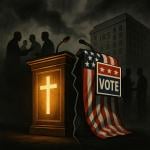THE QUESTION:
What should U.S. college graduates, and high school graduates, know about religion?
THE RELIGION GUY’S ANSWER:
A Gallup poll for the Bible Literacy Project 15 years ago found only about a third of U.S. teen-agers knew about Islam’s holy month of Ramadan or that the Quran is the religion’s holy book. The youths generally did better on Christian questions, though only a third could identify the significance of the “road to Damascus” and a tenth couldn’t say what Easter is.
The Religion Guy guesses that, if anything, teens in 2019 would do worse, due to the increase of religiously unaffiliated “nones” in the younger generation. Meanwhile, religious illiteracy becomes a more important problem for cohesion and understanding among the American people as diversity reaches beyond the Protestant – Catholic – Jew triad of times past.
Concerned about this, the Arthur Vining Davis Foundations (established by the late industrialist, a Congregational preacher’s kid) sought help from the American Academy of Religion, a professional association of some 8,000 college-level religion teachers. The result was a three-year study that concluded October 3 with the release of “AAR Religious Literacy Guidelines: What U.S. College Graduates Need to Understand about Religion.” See https://www.aarweb.org/sites/default/files/pdfs/Literacy%20Guidelines/AAR%20Religious%20Literacy%20Guidelines.pdf
What we do not get in this AAR booklet is answers to the question The Guy poses above, what information people should know by the time they have earned a two-year or a four-year degree. That’s not surprising, given the complexity of the field of religion.
Instead, we’re informed on what grads need to “understand.” Two major points from the AAR team are that religion is central for every human culture that has ever existed, and that therefore people need to have a good grasp of reliable, non-sectarian information in this field. It distinguishes academic study of religion, which is “descriptive,” from the “prescriptive” education that people receive from their faith groups. We’re told it is important to “recognize the internal diversity within religious traditions.” (By the way, these are good reminders for those of us who write about religious affairs for general audiences.)
The AAR ideally would like every U.S. college student to take at least one course of academic-style religion study but “this is not currently feasible.” There’s no way to force such a requirement upon 4,500 U.S. campuses, many of which don’t have religion departments. So the hope is that at least religion will be treated intelligently in all subject areas where it naturally fits with the content.
(Here The Guy’s colleagues who provide media criticism at www.getreligion.org would underscore how often news outlets downplay or totally ignore obvious and significant religious aspects of public events.)
It’s very important that these scholars oppose either “promotion or denigration of religions” in classrooms. The second point is the more likely problem on today’s campuses. Believers from whatever faith viewpoint can often feel that supposed objective treatment slips into hostility, and that “equal time” is rarely given to conservative viewpoints that challenge the secular zeitgeist, particularly regarding Bible debates.
Much “prescriptive” and voluntary religious learning is available from the religiously sponsored foundations that cluster around all campuses. However, there’ve been years of struggles between administrators and groups like InterVarsity Christian Fellowship that are regularly threatened with denial of normal campus access due to their sexuality beliefs.
The Religion Guy thinks it’s even more important for the health of American society that we focus on the need for all high school graduates to know the basics about our religious communities. He would advocate that every public school offer a semester elective on comparative world religions and a semester on the Bible, both taught from a carefully respectful and non-sectarian standpoint.
The AAR addressed this need in a similar but more detailed booklet issued in 2010, “Guidelines for Teaching About Religion in K-12 Public Schools in the United States,” that we can assume – or hope – has been read by every U.S. school administrator and board member. See https://www.aarweb.org/sites/default/files/pdfs/Publications/epublications/AARK-12CurriculumGuidelines.pdf This booklet recommends that by graduation day students be familiar with eight “living religious traditions”: Buddhism, Christianity, Confucianism, Hinduism, Islam, Judaism, Taoism, and “indigenous regional religions” in America and elsewhere.
The AAR guidelines deal, for example, with how to handle the respective role of Jews and Romans in the crucifixion of Jesus, the internal diversity of major faiths (e.g. on whether Buddhists regard The Buddha as a god), and that those in our time that cite divine inspiration for terrorism are only a “minority of Muslims.” Regarding Darwin and evolution, the AAR recommends that “intelligent design” or “creation science” be presented in social studies classes rather than science classes because these worldviews “fall outside the realm of science.”
In terms of curriculum, the Bible is a bigger challenge for public schools than world religions, given the many modern disputes over interpretation. Fortunately, the aforementioned Bible Literacy Project sponsored an interreligious team to produce such a textbook, “The Bible and Its Influence.” See http://www.bibleliteracy.org. Every public school system should consider making use of this book, available since 2005.
A final point here is whether public schools teaching about religion violate the Constitution’s ban on “establishment of religion” by government. The U.S. Supreme Court’s ruling that outlawed devotional-style school Bible readings and prayers offered this clarification:
“It might well be said that one’s education is not complete without a study of comparative religion or the history of religion and its relationship to the advancement of civilization. It certainly may be said that the Bible is worthy of study for its literary and historic qualities.” In the public school setting, this material should be “presented objectively as part of a secular program of education.”












